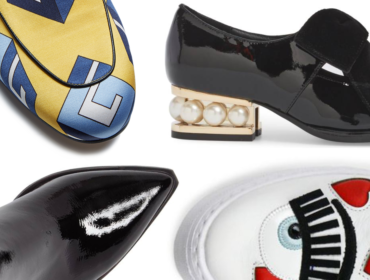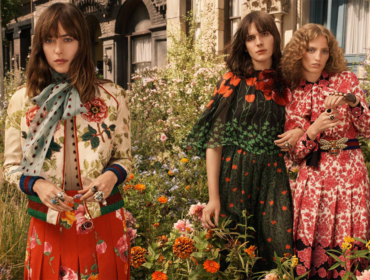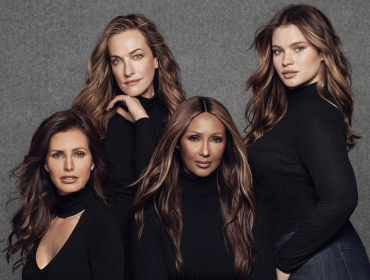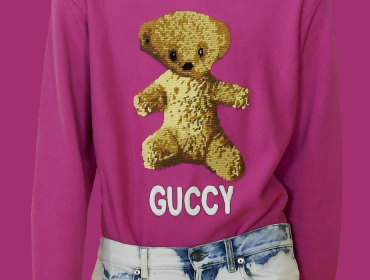Is the burqa a mask to hide a woman from the rest of the world or is it a tool of dress to exhibit her cultural beliefs?
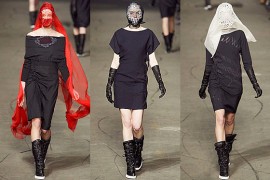
Marithé François Girbaud at Paris Fashion Week Spring 2011 (Image credit: nymag.com)
France — Paris, one of the indisputable fashion capitals of the world, is threatening the instatement of a law that goes against the average standards of a fashion powerhouse.
On September 14, 2010, the French senate approved a ban on wearing all veils covering the face, including the Islamic originated burqa, which makes France the first European country to do so. The law will go into effect in early 2011. Now that 2010 is coming to a close, it brings us to ponder whether this new law — in a fashion and social sense — is a warranted concern or worrisome debate.
Despite the fact that an attire-related ban was made, there were no decrease in runway shows or collections shown during Paris Fashion Week Spring 2011. Each season the city anxiously awaits the display of new fashions. This time, Paris contradicted itself, while promoting fashion choice and simultaneously dictating the removal of a garment some women choose to wear.
But, some fashion designers took a different approach to the uproar burqa banning spurred by presenting Burqa-inspired designs as part of their collections. French designer Marithé François Girbaud exhibited a somewhat literal translation with models fashioned in long structured dresses and masked in sheer veils.
The history of the burqa — as well as many veils that cover the face — is historically for religious and cultural purposes. So, why would France want to ban a garment steeped in tradition?
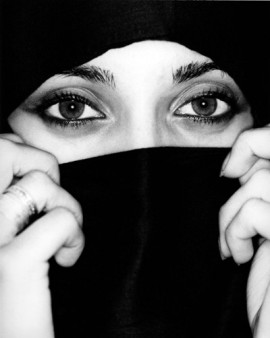
(Photo credit: picasaweb.google.com)
Reportedly, French President Nicolas Sarkozy believes the burqa to be highly distracting and that by wearing one, a person disrespects France’s cultural rule of face-to-face interaction between individuals. Arguably, a person’s eyes are the most telling and powerful anatomical part of their face. Therefore, since the eyes can be fully viewed when a woman is wearing a burqa, the argument of a complete lack of facial communication may be null.
Women who wear the burqa do not refuse to communicate with others and are not inhibited from doing so simply because of the fact that their faces (minus the eyes) and bodies are covered. The burqa is made from a light, loose cloth material that does not restrict speech or communication in any way. In extreme cases, a woman may have to speak a bit louder than normal because of the fabric hanging over her mouth. While a lack of communication is a reasonable argument, the act of participating in society is in no way threatened or impossible while wearing a burqa.
Further arguments against the wearing of the burqa are the impending medical conditions that may develop as a result of such enveloping outer garments. Covering one’s entire body in such a way can cause Hypovitiminosis D, a deficiency of Vitamin D. This deficiency can cause rickets and osteoporosis and can increase the risk of seizures in infants born to infected mothers. Concerns of these outcomes can be remedied by Vitamin D supplements and by remaining active. But, there is no disease directly related to wearing burqas, so any number of diseases that have a remote connection to the covering of one’s body cannot be blamed by this attire alone.
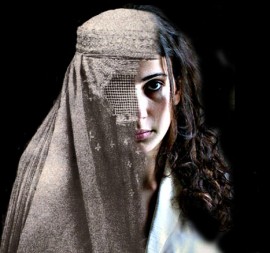
(Photo credit: accademia-teatrale.it)
There is also the issue of the social oppression the burqa represents for many Islamic women. However, the choice to wear a burqa or any face-covering veil should be an individual choice. A government, cultural group, or religious order should not impend rules against or for its usage.
To wear or not to wear a burqa is a heated debate that has a global impact socially. Even popular culture has addressed the issue, most recently in the “Sex and the City 2” movie, in which they visit Dubai. Everyone has an opinion one way or another on this issue, but is a government ban on a garment steeped in tradition, any better than a cultural doctrine that uses the garment to oppress? Or maybe it’s just another instance of silencing the wearer — a woman.

